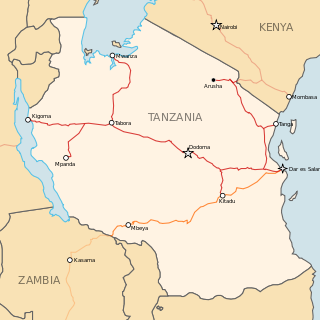
Bujumbura, formerly Usumbura, is the economic capital, largest city and main port of Burundi. It ships most of the country's chief export, coffee, as well as cotton and tin ore. Bujumbura was formerly the country's political capital. In late December 2018, Burundian president Pierre Nkurunziza announced that he would follow through on a 2007 promise to return Gitega its former political capital status, with Bujumbura remaining as economical capital and center of commerce. A vote in the Parliament of Burundi made the change official on 16 January 2019, with all branches of government expected to move to Gitega within three years.
The Hutu, also known as the Abahutu, are a Bantu ethnic group which is native to the African Great Lakes region. They mainly live in Rwanda, Burundi, and Uganda where they form one of the principal ethnic groups alongside the Tutsi and the Great Lakes Twa.
The Tutsi, also called Watusi, Watutsi or Abatutsi, are an ethnic group of the African Great Lakes region. They are a Bantu-speaking ethnic group and the second largest of three main ethnic groups in Rwanda and Burundi.

The RG-31 Nyala is a 4×4 multi-purpose Mine-Resistant Ambush Protected Vehicle manufactured in South Africa by Land Systems OMC, located in Benoni, South Africa and in Turkey by FNSS Defence Systems. It is based on the Mamba APC of TFM Industries.

This article lists the prime ministers of Burundi since the formation of the post of Prime Minister of Burundi in 1961 until the present day. The office of Prime Minister was most recently abolished in 1998, and reinstated in 2020 with the appointment of Alain-Guillaume Bunyoni.

The Burundi national football team,, nicknamed The Swallows, represents Burundi in international football and is controlled by the Football Federation of Burundi. The team has never qualified for the World Cup. Burundi previously did come very close to qualifying for the 1994 Africa Cup of Nations, losing only on penalties to Guinea in a playoff. However, in 2019, it qualified for the first time, and took part in the Africa Cup of Nations finals in Group B, but lost all its matches and left from the group stage without scoring a single goal.

Pierre Nkurunziza was a Burundian politician who served as the ninth president of Burundi for almost 15 years from August 2005 until his death in June 2020.

Survivor Corps, formerly known as the Landmine Survivors Network, was a global network of survivors helping survivors to recover from war, rebuild their communities, and break cycles of violence. The organization operated programs in Albania, Armenia, Azerbaijan, Bosnia-Herzegovina, Burundi, Colombia, Croatia, El Salvador, Ethiopia, Georgia, Jordan, Kosovo, Macedonia, Montenegro, Serbia, Uganda, Rwanda, the United States and Vietnam.

The Parliamentary Monarchist Party (PMP) is a small royalist party in Burundi which seeks the restoration of the monarchy, deposed in a coup in 1966. It was founded by Guillaume Ruzoviyo in August 2001. The party has no elected representatives in parliament and Guillaume Ruzoviyo has not held a government post since the end of 2005, but the PMP rallied in a coalition of 10 parties at the 2010 general elections, and obtained the management of the Burundi Embassy in Russia. PMP is member of International Monarchist Conference.

Rail transport in Tanzania is conducted by two companies. It has historically used narrow gauge trackage, but planning and construction of new standard gauge lines is underway as of 2017.

The RG-33 is a mine-resistant light armored vehicle initially designed by BAE Systems Land Systems South Africa, a South African subsidiary of BAE Systems. BAE Systems in the US extensively modified it with additional protection, new powertrain, and suspension systems. It was built in a number of locations including York, Pennsylvania. It was one of several vehicles being fielded by the US Armed Forces in Iraq under the MRAP program.
Lake Cyohoha South or Cyohoha Sud as it is known in Rwanda or Lake Cohoha in Burundi is a small lake in East Africa. It straddles the border between Burundi and Rwanda.
Burundi is a producer of columbium (niobium) and tantalum ore, tin ore, and tungsten ore, and some deposits of gold which are designated for export. Burundi has resources of copper, cobalt, nickel, feldspar, phosphate rock, quartzite, and rare reserves of uranium, and vanadium.

The Burundi Ministry of Energy and Mines also known as the Ministry of Hydraulics, Energy and Mines is responsible for managing energy development and distribution in Burundi. The main function of the Ministry of Energy and Mines include: design and implement the National policy in energy, geology and Mines; promote geological research and mining industry activities; developing and implementing policies related to electricity, minerals, petroleum and petroleum products. The current Cabinet Minister of Energy is Hon. Ibrahim Uwizeye, Jiji and Mulembwe Hydropower Project (PHJIMU), Hydro-Electric Plant Mpanda, Hydro-Electric Plant Kabu 16, Hydro-Electric Plant Rusumo falls, Kagu Project, Ruzizi III, Ruvyironza, Hydro-Electric Plant in Kirasa-Karonge, Peat Power Project.
There are several planned railway lines in Rwanda, including a line to Tanzania. Historical railways are limited to three industrial railways.

Burundi, officially the Republic of Burundi, is a landlocked country in the Great Rift Valley at the junction between the African Great Lakes region and Southeast Africa, with population of over 14 million people. It is bordered by Rwanda to the north, Tanzania to the east and southeast, and the Democratic Republic of the Congo to the west; Lake Tanganyika lies along its southwestern border. The capital city is Gitega and the largest city is Bujumbura.
A ministry of energy or department of energy is a government department in some countries that typically oversees the production of fuel and electricity; in the United States, however, it manages nuclear weapons development and conducts energy-related research and development. The person in charge of such a department is usually known as a minister of energy or minister for energy.
The Ministry of Mines and Energy is a top-level government entity in several countries, responsible for the oversight of mining and energy production and consumption. The following articles cover individual Ministries of Mines and Energy:
Burundi ratified the 2000 UN TIP Protocol in May 2012.

The Authority for Regulation of Water and Energy Sectors is an independent regulatory authority of Burundi mandated to provide for technical and economic regulation of electricity and water utilities.










